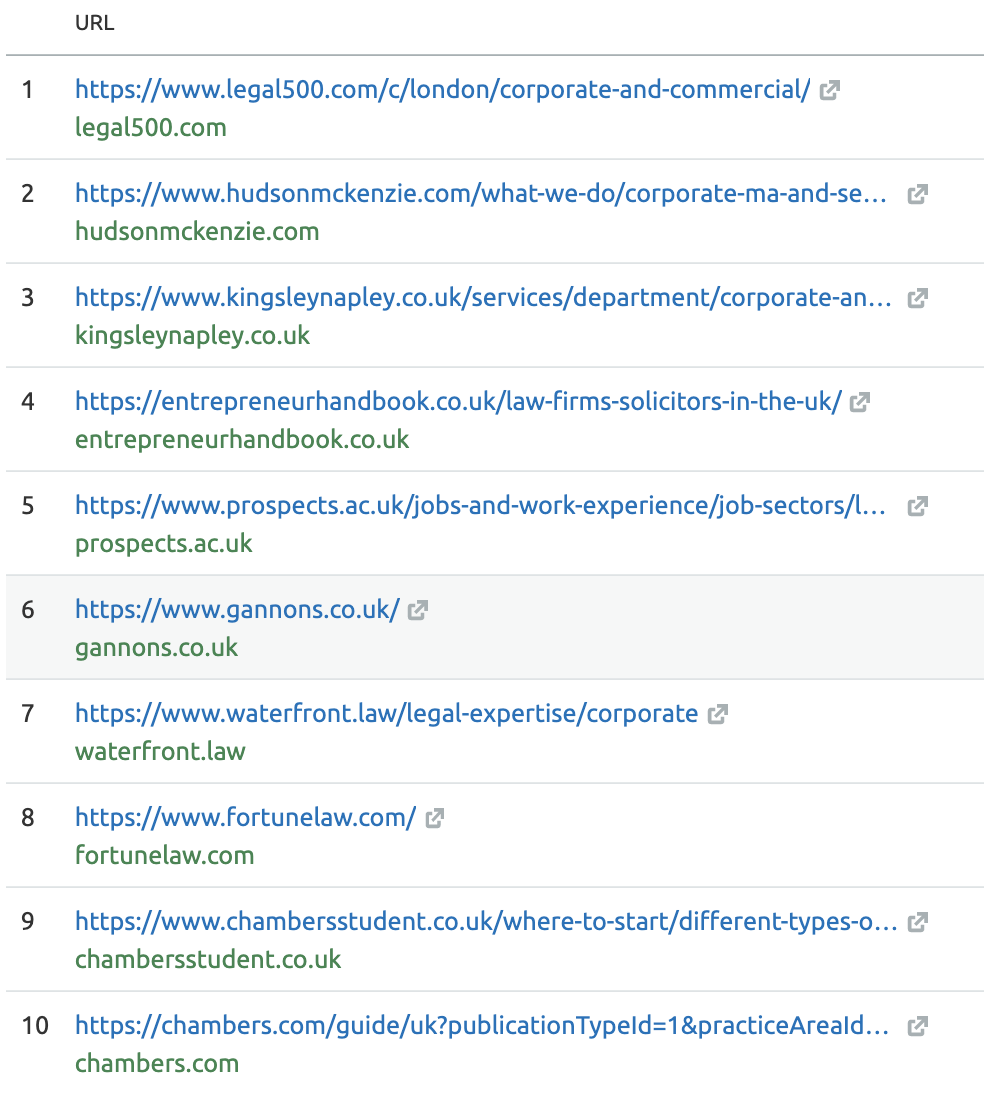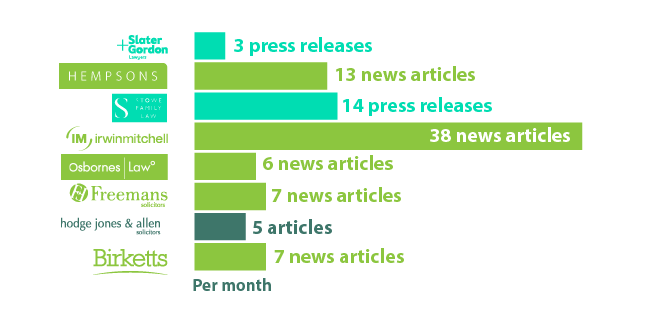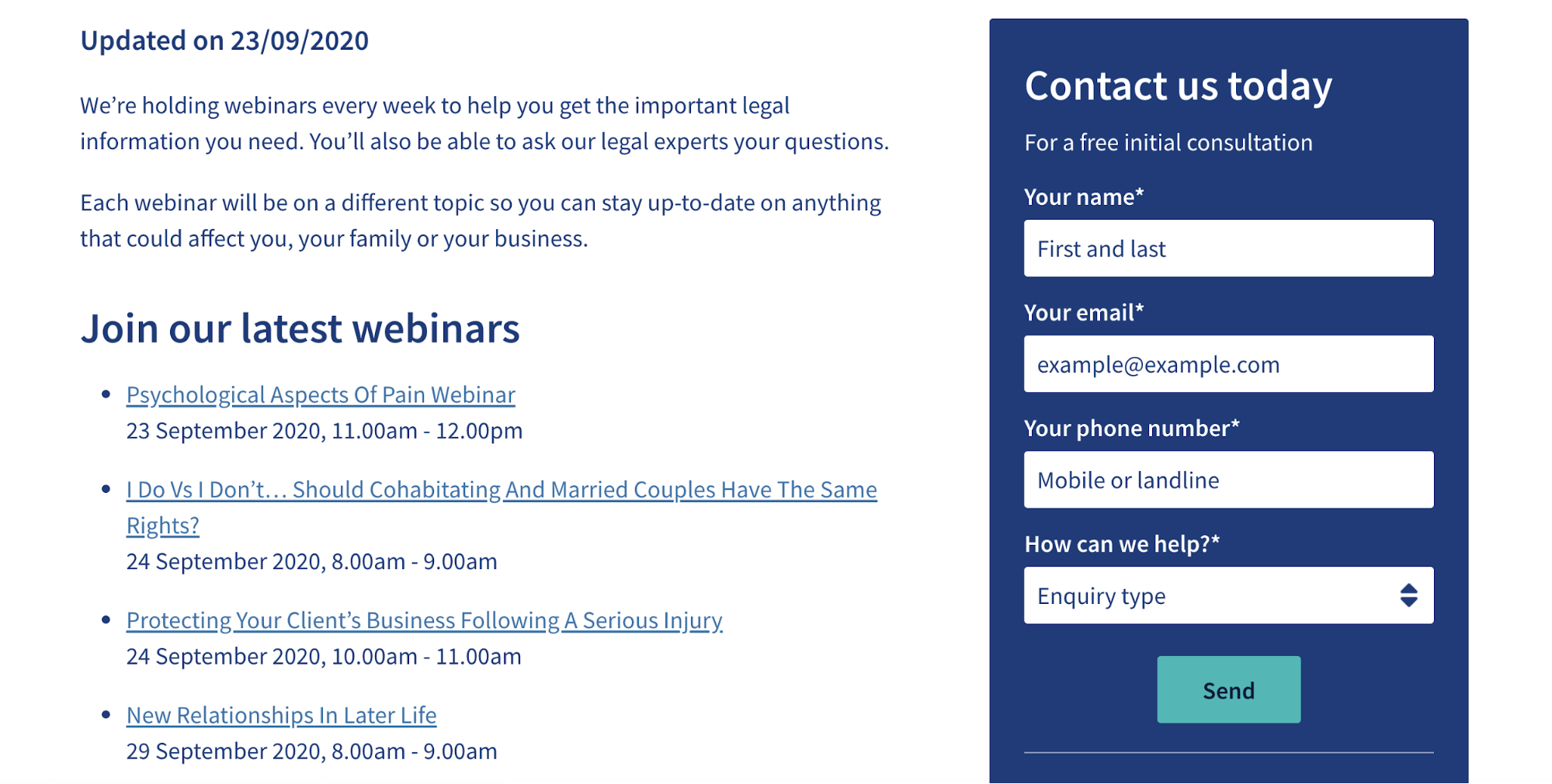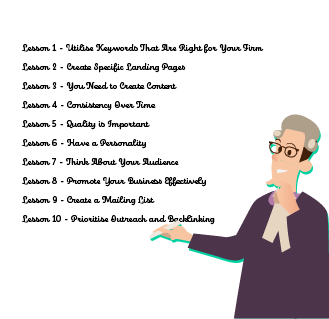If you are a legal firm, right now you may be contemplating the best way to approach your online content. Especially as a method to get your legal firm’s website ranking highly for key phrases in search engines. For instance, phrases such as ‘legal companies manchester’ or ‘family law lawyers cardiff’.
Don’t worry, you are not alone if you feel overwhelmed and unsure where to begin.
One of the main problems with content marketing is that everyone talks about it. But no one actually tells you what the most effective approach is to maximise your efforts.
There are many different approaches to content marketing. But the key point is to ensure your content is suited to your target audience and their requirements. And not simply about your company’s perspective.
Learn From the Best Content Marketers in The Legal Industry

Instead of beginning from scratch, begin by applying principles gleaned from top legal firms. Then adapt those principles to your own efforts.
To support this effort, we’ve already analysed the top examples of content marketing taken from legal firms. And this will help you understand what firms are currently doing with their content marketing. For instance, what is working and what isn’t. As a result, hopefully it will inspire you to begin your legal content marketing journey.
But, whilst these examples are great, it is also important to understand the key content marketing considerations. That is the tenets that any legal firm should follow or have before beginning to create their own content.
With this in mind, we have put together 12 content marketing legal firm lessons from the best. These examples will help legal firms begin their content marketing journey without having to waste time learning what not to do.
In fact, with these lessons, we hope to ensure that your legal firm’s content marketing strategy will achieve the results you expect.
Lesson 1 - Utilise Keywords That Are Right for Your Firm

Keywords are one of the most important factors in content marketing.
Without SEO and keywords, your firm’s website won’t be found on Google for appropriate terms your customers are searching for.
If you don’t use the correct keywords or phrases within your content you will be invisible. Because, you will make it hard for Google to ensure your website appears within relevant searches. And if you aren’t appearing then your firm won’t be found.
For example, Hudson McKenzie ranks second in Google for “corporate law firms London” (October 2020).

And this position is likely worth thousands of potential customers.
The link leads to a targeted landing page on Hudson McKenzie’s website.
This page receives more traffic than their homepage does. And thanks to it’s high keyword ranking, this one single page accounts for 39% of the website’s monthly views.

In fact, this single page also ranks for 46 other keywords. This includes variations of the keyword “corporate law firms London”. The following words append to the word “corporate”:
- “lawyers London” (no 1)
- “law solicitors London” (top 3)
- “law firms” (no 4)
- “solicitors London” (top 3)
This doesn’t just happen naturally. The landing page is intentionally filled with the keywords specific to corporate lawyers.
Compare this however to Goodman Derrick LLP, another legal firm in London.
While they also rank for “corporate law firms London” they sit in position 23.
One of the main reasons why they are so far behind is because of a lack of keywords.
To illustrate this point, their homepage features the words “London”, “law” and “legal” twice. And only uses the word “corporate” once.
To be clear, we do not promote keyword stuffing. But it does make sense to at least use the keywords you are trying to rank for on the page.
Don’t be surprised when a competitor outranks you because they optimise their content towards this goal.
If Goodman Derrick actually did optimise their site better, imagine where they could rank.
Of course, this is a very simple explanation of on-page SEO. But we have used it to make a point.
For many, this is obvious. However, you would be surprised how many businesses want to rank for keywords that they don’t even use on their site.
Lesson 2 - Create Specific Landing Pages
Use landing pages to provide potential customers with detailed information about the services you offer.
Overall, your landing pages should target short-tail keywords. For example, “family lawyer London” or “best divorce lawyers”.

But, it is also important to rank well for long-tailed keywords too. Because there is less competition for those terms with everyone trying to rank for the short-tailed ones.
Less competition means you are more likely to rank for those phrases with your content.
More importantly however, is that conversion tends to increase if the search is long-tailed. Which means that even though there might be less people coming through the door, those that do are more likely to get in contact. Especially when those pages are specialised around a core service.
A great example of a firm that creates specialist pages is Freemans Solicitors.
On their website they have specific landing pages on the following:
- Family, Children, and Divorce
- Property
- Crime
- Family Mediation
- Wills, Estate Planning, and Probate
- Driving Offenses
- Immigration
- Employment
- Commercial Property
- Company and Business Law
Let’s take a look at one of these pages – Family, Children, and Divorce.
This one landing page receives 44.25% of the firm’s total traffic. Which equates to 3,500 monthly views.

This page receives more traffic than its homepage!
And it also ranks for 122 keywords. Take a look:

This page ranks for both short and long tailed family law terms, for example:
Freemans Solicitors are ranked number one in search engine results for the term – family solicitors near me which receive 3,600 monthly searches. All of which are exposed to Freemans Solicitors page – in fact, 21.68% of this page’s traffic comes from this one keyword area.
But that’s not the only high ranking keyword. In fact, 9% of the page’s traffic comes from the keyword – “family solicitors”. Which has a search volume of 5,400 a month.
From this, we would expect most of the new work Freemans takes on to be family law related.
However, remember to conduct keyword research to understand what keywords are right for your business.
Once you have decided on keywords, conduct some competitor analysis research into what already ranks.
Use this information to build keyword optimised content pages which are better suited for your audience to help your business standout.
Lesson 3 - You Need to Create Content
Landing pages are important, but you can’t stop there.
To be great at content means you need to utilise several formats to reach different audiences.
For example, let’s take a look at Clifford Chance. Here are some of the formats they use:
- Podcasts
- Presentations
- Webinars
- How-to Guides
- Interviews With Experts
- Videos
- Brochures
- Press Releases
- Client Briefings
- Newsletters
- Landing Pages
- Blogs
- News
- Social Media
They produce at least one piece of news content each working day (Monday-Friday). In fact, sometimes they produce even more than one piece a day.
However, this doesn’t include work dedicated to promoting this content either, e.g. email marketing or posting on social media.
In other words, they have built a legal content marketing machine. Clearly, this firm sees content marketing as paramount for long-term business growth.
In comparison, let’s look at some of these other legal firms to see how often they publish content:
- Slater and Gordon publishes an average of 3 press releases a month
- Hempsons publishes an average of 13 news articles per month
- Stowe Family Law publishes an average of 14 press releases a month
- Irwin Mitchell publishes an average of 38 news articles per month
- Osbournes Law publishes an average of 6 news articles per month
- Freemans Solicitors publishes an average of 7 news articles per month
- Hodge, Jones & Allen produces an average of 5 articles per month
- Birketts publishes an average of 7 news articles per month

Evidently, if your goal is to win content marketing as a legal firm, then this provides you some insight into the race you are entering.
In addition, it might also indicate the investment required to beat some of the competitors listed above.
This is why, in most cases, it is a much smarter content strategy for newcomers to specialise and find their niche.
Concentrate on winning the smaller battle, rather than to fighting a war on all fronts.
Lesson 4 - Consistency Over Time
High-quality content takes hours to create. But that is nothing compared to how long it can take for your content to start rising within search engines.
For example, Stowe Family Law, like many other firms, has a blog.

One of their articles on their blog is called ‘How Much Child Maintenance Should I Pay?’. And it ranks for 138 keywords.
However, one keyword it ranks for is “child maintenance calculator.” Which gets an average of 49,500 monthly searches.
But note, this blog was first published in April 2020, when it was first ranked at number 48 in search results.
It took almost a year before it was increased to position 8 (first page of Google).

And if you think that was slow, this page was supported by 512 backlinks from 7 referring domains. All of which helped it along the way.
This means that Stowe Family Law was promoting the content to try and get it to rank.
And this is built on the back of creating content for almost 10 years.
In other words, consistency over time is a major factor for rankings.
Stowe Family Law has domain authority of 45 and 106,400 backlinks from 1,300 referring domains.
This all supports their overall growth.
But if you want to focus on content marketing, you need to be in it for the long haul. Just creating a few articles for a few months isn’t going to achieve anything.
Just in the same way one single press up isn’t going to give you massive biceps.
Expect to be in the content marketing game for the long term. Of course, content marketing is hard, but it’s worth it. In fact, the longer and harder you work at it, the more successful you will be.
Lesson 5 - Quality is Important
If you publish content just for content’s sake, then it isn’t going to obtain results.
Your content should be something you are proud of. Great content is something you are proud for people to read, and something your clients would find useful or interesting.
So to produce average content will just show your business is average.
Creating average content, but expecting amazing results from it is a key reason why companies fail at content marketing.
Quality is difficult to measure, as it is dependent on what the content sets out to achieve.
The key point is to start with your audience in mind, potentially by asking the following 12 questions:
- Why am I creating this piece of content?
- Who am I creating this content for? Who is my ideal reader?
- What question does this piece of content answer?
- Why would my audience care?
- How does this help my audience?
- What can my audience expect to gain from this content?
- What content currently ranks at number one for these keywords now?
- Why do you think it ranks well for these keywords?
- Does this piece of content address my aims (explainer, landing page or article)?
- Is this the best content I can produce? Or could something be better?
- Is there a different angle which might convert better or be more engaging?
- What do you want the audience to do with this piece of content (e.g. sign up to x)? And would you sign up if you were in their position?
When you have considered all these factors and produced the best piece of content you can produce.
Only then is it time to hit publish knowing that you have actually designed a piece of content with your audience in mind.
Lesson 6 - Have a Personality
Some people say that your words reflect you as a person, this is the same for your content.
In fact, the words you write or say or how you act in a video represents who your company is.
The most well-received content has a personality and a voice. Your tone, style of writing, layout, and colour palette, all define your brand.

By creating a personality within your content, your viewers will identify your brand, build a trusting relationship with it, and decide what your company represents.
Before you create content, consider the following points to help you first create the personality of your firm:
- Decide how to humanise your firm – Showcase that there are people behind your brand. Considering the industry as a whole, how can you come across as real, transparent, and convey the points you want to.
- Decide how you want your content to be portrayed – Do you want to write to persuade people to use your firm, be informative, or stir up or start a discussion. Maybe it’s a bit of all three?
- Use emotions within your content – How do you want your audience to feel when they read your content? For example, if you deal with divorce law, you are dealing with people who are under a lot of emotional stress. So ensure you cater for that.
- Tell a story – Behind all good content is good storytelling. Why not look to case studies for inspiration?
- Be consistent with your audience – Use the same colour palette, layout, graphics, logos, and structure across all content.
- Use your language – Ensure you use language and tone in order to reflect who you want to communicate with. And keep it consistent across all content and social interactions.
- Structure your content – Utilise similar layouts. For example, each blog post could begin with an introduction, use subheadings in the main text, then end with a summary.
Once you have considered all these points, you’ll start to create content which speaks to your audience on their level. Which will start to build a relationship built on a solid identity.
Overall, people don’t trust brands that confuse them or are inconsistent.
Lesson 7 - Think About Your Audience

To create the best possible content to help your firm, you need to know who your target audience is.
For instance:
- Who are you writing for?
- Why should they care about you?
- What value can you give them?
- Why listen to you over everyone else similar to you?
Think about how you would talk to an individual who is looking for a lawyer to help with their divorce in an article.
Would this be the same as a business looking for a corporate lawyer?
Of course, it wouldn’t.
In both of these examples, the voice and tone of your content would be completely different.
From how you voice your content, how you promote it, and the overall style of the content.
However, in both cases you are writing for different people. These individuals are all looking for different outcomes and expecting different levels of dialogue.
Put simply, you need to think about your content from the point of view of the audience and what they need.
Quality traffic is more important than the quantity of traffic.
Lesson 8 - Promote Your Business Effectively with Social Media.

Content creation is only half of the story.
You could create the best subject article in human history.
But, if no one sees it, no one cares – that’s why promotion is so important.
One of the best ways for legal firms to promote content is through social media.
Social media might not be the first thing you think of when it comes to legal firms, but it should be.
For B2B businesses – LinkedIn is a great promotion method for professional content.
- Links to press releases
- Video content
- Journals
- Links to blog articles
- Links to webinars
- Video content of employees talking about FAQs
- Notifications of new employees or promotions
- Notifications of awards won or general news within the firm
- New partnerships or sponsorships
The key to social media is ensuring your content is relevant and targeted correctly.
For example, on LinkedIn, you might want to share:
- Links to press releases
- Video content
- Journals
- Links to blog articles
- Links to webinars
- Video content of employees talking about FAQs
- Notifications of new employees or promotions
- Notifications of awards won or general news within the firm
- New partnerships or sponsorships
Some of this might be applicable for Instagram too, but maybe it isn’t. Build your social media plan according to the strengths of each platform. And think about the platforms your prospective clients use. Focus on these.
But remember, doing anything, just for the sake of it, isn’t a great position to be in. Never post content simply because you can, it isn’t going to achieve anything.
Similar to lesson 4, social media is all about consistency over time.
You can’t just create social media channels and leave them. As nothing will happen, you won’t create a following and unsurprisingly, no one will see your content.
Lesson 9 - Create a Mailing List
One of the best ways to send information or links directly to existing or potential clients is via email.
Mailing lists have become a great way to communicate with potential clients or leads. This can be in the form of:
- Links to new blogs
- News articles
- Firm news
- Any important notifications
- General newsletters
- Seasonal messages
In fact, a mailing list is as important as every other form of content marketing for legal companies.
Mailing lists can help to direct clients to specific news articles or blog posts. Which will help you to gain traffic. In addition to creating a relationship between your firm and its clients.
Being constantly exposed to a firm via email newsletters will ensure your clients or potential clients create a trusting relationship with your brand. It nurtures brand awareness – so that if they require legal services, you will be the firm they think of first.
For example, the legal firm Birketts does this extremely well. First, they have an email sign-up form located front and centre on their homepage. As a result, everyone who visits the homepage has the opportunity to sign-up.

Birketts homepage receives 36.5% of the firm’s total traffic. Which is 3,500 monthly views. All of which have the opportunity to sign-up to receive email updates.

In fact, this is something your firm could very easily do. Start collecting the email addresses of potential clients and leads (with permission of course).
You could create bi-weekly email newsletters with company information, links to news articles, or anything else you think your clients would find interesting.
Emails from legal firms have an average open rate of 16.49% and an average click-through rate of 7.43%. This is significantly higher than the average rates for all industries.
So if you haven’t already thought about it, email marketing could be a great promotional tool. Especially alongside other content marketing methods as part of your overall legal content marketing strategy.
Lesson 10 - Prioritise Outreach and Backlinking
If you have read anything about content marketing and Google rankings you will know the importance of backlinking.
Backlinking is one of the most important factors Google takes into account when ranking search engine results and domain authorities.
Gaining and creating new backlinks should be a vital part of your legal content marketing strategy. As search engines see backlinks as a sign of importance and credibility for a website.
If your website has a high number of backlinks from high domain authority websites, Google will see that as a sign your website contains useful information. And as a result, your website will be considered as worth displaying high in search results.
Here, we can learn from the best at digital PR: Slater and Gordon.
Slater and Gordon have received 112,000 backlinks from 3,200 referring domains. And this is fantastic for a legal company.
But this isn’t by accident. In fact, they have perfected a PR and content machine to drive that behaviour.
As such, they have been gaining backlinks from a hybrid content-PR strategy, natural backlinks and guest blogs. All of which have systematically driven their growth.
Here are some of the referring domains Slater and Gordon have gained:

One of the main ways Slater and Gordon gain backlinks is through press releases.
Which often get picked up by large news publications who then, in turn, write a news article around it.
As a result, the firm has backlinks from:
- Yahoo – DA 91
- BBC – DA 88
- NY Times – DA 87
- The Guardian – DA 86
- The Washington Post – DA 86
- Harvard.edu – DA 86
- Business Insider – DA 84
All of these backlinks and more have helped Slater and Gordon to achieve a DA of 54.
There are a large number of ways you can create backlinks. In fact, we have created an article which features 6 examples of backlinking strategies for legal firms.
And these strategies include:
- The creation of high-quality content which is above industry standard and gains its own backlinks
- Putting your firm’s office information into an online directory
- Reaching out to legal blogs or websites that allow guest blogging to pitch your article ideas to
- Creating press releases just like Slater and Gordon, and reaching out to news publications
Overall, backlinking should be a welcome addition to your legal content marketing strategy. Although it may take time and effort to set up and reach out to other websites. Undoubtedly, it’s worth the effort and time.
Lesson 11 - Collect Reviews and Social Proof
While searching for a service, the majority of people turn to friends and family for recommendations. And, the same is true when someone chooses a legal firm.
In fact, 65% of clients state that online reviews influence their decisions when choosing a legal firm to work with.
Many legal firms have recognised this. As a result, they showcase reviews and testimonials front and centre on their websites.
Stowe Family Law is a great example of this. They have testimonials located directly on their homepage.

These reviews also act as great social proof. For any potential client who lands on their homepage, they have the opportunity to read the recommendations and feedback.
And the only thing you have to do to gain these reviews is to reach out to clients or previous clients. Simply ask them to write a review or even record a video detailing what it was like to work with your firm.
From there you can create articles, testimonials, or videos from these reviews. All of which make great content to put directly on your website.
Potential clients want to work with a firm they can trust to be professional and help them achieve their aims. As such, social proof and testimonials help legal firms to assist prospective clients in their decision.
Lesson 12 - Humanise your Firm

People like to work with people.
Whatever the area of the law your firm specialises in, people want to know the people behind the firm.
In fact, people are more likely to work with a firm if they see the people behind it. They want to establish trust and have a relationship with you. Especially when it comes to legal firms.
For example, ways you can humanise your legal firm include:
- Creating videos of lawyers talking about their areas of expertise
- Showcasing information, achievements, and images of your employees
- Holding webinars on a variety of subjects to allow potential clients or existing clients to join a video chat, to ask questions live and interact with lawyers
And one legal firm who is already doing this is Irwin Mitchell. They have created a series of webinars, so their viewers can ask questions and join discussions. In addition, their webinars provide people with the opportunity to learn about different areas of the law.

Irwin Mitchell uses webinars to allow people all around the world to join together to learn about a theme, topic, or ask questions.
Webinars can run anywhere between half an hour to an hour-long. In fact, they’re quick and easy to organise.
With promotion and organisation, your firm can quite easily set up a webinar. You can use your website and social media to ask people to join in too.
Use what you have at your disposal. For instance, you can utilise lawyers at your firm as experts on a topic or area of the law. All they need is a webcam.
Summary
Content marketing is always worth the investment. With these 12 lessons, you can begin your legal content marketing journey.
But these lessons are just the beginning. Because it takes time and resources to create and implement a long-term content marketing strategy.
Take control of your business growth and use it as a way to grow or be recognised as a trusted legal firm that provides a great service.
Work With a Marketing Consultancy to Put These 12 Lessons into Practice
Many legal firms often approach a market consultancy just like ours, in order to help them grow online through content marketing.
We run website analysis reports to evaluate your current position in the market, to identify what your firm needs to rank highly and be successful online.
In addition, we create tailored competitor analysis reports. To advise you on the best strategies required to outrank and outperform your competitors.
So why get in touch for an obligation-free chat? And find out exactly what we can do to take your firm to the next level and help you to achieve your goals.








